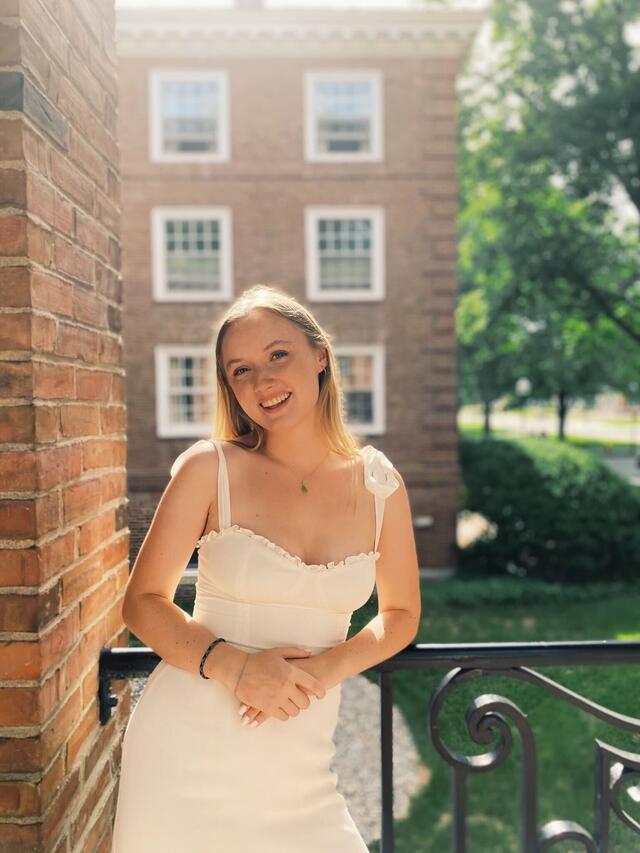
Program Assistant Introduction: Ciara Comerford ’23
Note from Admissions: Welcome back for the 2023 semester! We are excited to welcome two new PAs this semester, Ciara and Karoline. They'll be joining PA Jules, PA Shally, PA Clara, and PA Fitri in helping you through the application and decision process over the next few months. You can learn more about assistantships and what PAS do here.

Ciara is a second-year Masters of International Affairs (MIA) candidate concentrating in Economic and Political Development and dual-specializing in International Conflict Resolution and Data Analytics and Quantitative Analysis. She was raised in London and graduated from Dartmouth College with a double major in Government and History and a minor in Spanish (for which she spent a term abroad at university in Buenos Aires). Her areas of interest include climate security - specifically in the peacebuilding space, transitional justice, and sustainable development initiatives as a lens for peace. She has interned at international law firms, microdevelopment-focussed NGOs, and Columbia’s own Advanced Consortium on Cooperation, Conflict and Complexity at the Earth Institute. In her free time, she likes to spend time outdoors (hiking, skiing, scuba diving), explore coffee shops and museums, or cook with friends.
What were you doing before you came to SIPA?
I came to SIPA straight from college, so I applied whilst I was in my senior year. This isn’t a traditional path, as most students have worked for some time and are frequently looking to make a career change, but I felt strongly that I would gain more from going to SIPA straight away than waiting and I had gained a lot of experience abroad and in my chosen field whilst at college. Fundamentally, I knew that I wanted to work in a very specific field that frequently required graduate degrees, and so I decided that applying straight to graduate school was the right step for me, rather than waiting a year or two before applying.
Can you comment specifically on some exciting things about your concentration?
I actually applied to SIPA as an International Security Policy (ISP) concentrator but changed within my first week after attending both information sessions. ISP is a great concentration, undoubtedly, but I found I wanted a more holistic approach to peacebuilding that EPD appeared to provide a better foundation for, which proved to be - in my opinion - absolutely right. I love EPD because of the breadth of the concentration and the way that each student has their own unique focus and approach to the courses that make the cohort really diverse and interesting.
Can you talk about your workshop experience?
I completed my capstone project, which for EPD students is the Workshop in Sustainable Development, as a first year. Our workshop focused on barriers to ESG investment in Latin America, for which we worked with Dalberg Advisors and Professor Jose Antonio Ocampo - who is now the Finance Minister in Colombia! Through the project I got to interview a multitude of practitioners and experts in governance, social, and environmental issues from think tanks, financial institutions, and legislatures. I found the workshop experience, as many people do, to be one of the most invaluable parts of my SIPA degree as the hands-on nature of the project is an unparalleled opportunity to try out a career within an academic setting.
Have you taken classes at other Columbia Schools?
This past term I took Transitional Justice with Professor Simpson at Columbia Law School. It was a fantastic class that had students from a variety of different programs and schools, and allowed me to really dive into a different approach to some of the content I had touched on in my classes at SIPA. Taking a class at another Columbia school is something that I think everybody should do during their time at SIPA, as not only does it teach you content that you may not be exposed to through SIPA’s course offerings, but other schools also have their own approaches to teaching that can change and expand how you think about topics and how you approach policy issues.
What was the most challenging aspect of the application process?
For me, I found it hardest to fully articulate why I should go to graduate school straight out of college, when that path is traditionally less popular. I found that I needed to be really clear with myself first about why I was so sure that was the right step for me, and then it was easier to articulate it to admissions committees. Once you know for yourself why you’re applying in the moment that you’re applying, then the next parts become a lot easier.
What advice do you have for current applicants?
I think spending time thinking about exactly who you are, and what experiences have shaped you is always an important first step to crafting an application. The next step, and the harder part for me, was figuring out exactly who I wanted to be, and how Columbia would shape that. I think that it’s important to be honest and brave when writing your essays. Perhaps being UN Secretary General might not be the most realistic career goal, but talk about what you hope to be 5, 10, 15 years down the line. Tell the admissions committee exactly what you do know about how you want your future to look, and why Columbia is the only possible next step to it.
One thing I would also say, especially for international students, is we sometimes come from cultures where being proud of your achievements is frowned upon. However, it’s important to remember that you are your best advocate and now is not the time to hope that the admissions committee will realize how great you are without you telling them. You are your own best advocate and as uncomfortable as it may be the admissions office won’t know telepathically why you should be admitted, you need to tell them!